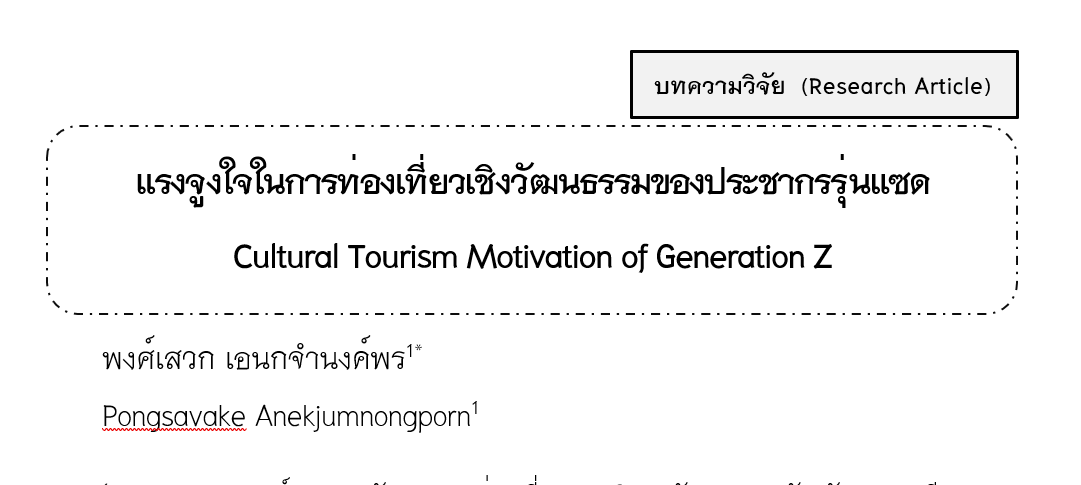Cultural Tourism Motivation of Generation Z
Keywords:
Motivation, Cultural Tourism, Generation ZAbstract
The objectives of this research were 1) to study the cultural tourism motivation level of generation Z and 2) to compare the cultural tourism motivation of generation Z from different personal factors. The sample was 212 generation Z selected by two-stage sampling. The research instruments were questionnaires. The data were analyzed using descriptive statistics and inferential statistics. The research findings were 1) the cultural tourism motivation level of generation Z was at the moderately high level. 2) Generation Z with different education indicated different the cultural tourism motivation (p<0.01), and there was not different the cultural tourism motivation in generation Z with different gender, age and family income.
References
กาญจนา แสงลิ้มสุวรรณ และศรันยา แสงลิ้มสุวรรณ. (2555). การท่องเที่ยวเชิงมรดกวัฒนธรรมอย่างยั่งยืน. วารสารนักบริหาร, 32(4), 139-146.
การท่องเที่ยวแห่งประเทศไทย. (2553). รายงานสรุปฉบับผู้บริหาร โครงการสํารวจทัศนคติและ พฤติกรรมด้านการท่องเที่ยวของชาวไทยในเขตกรุงเทพฯ และปริมณฑล. จาก https://etatjournal.files.wordpress.com/2011/01/executivesummary_bangkokian-tourist-behavior.pdf.
กิตติศักดิ์ กลิ่นหมื่นไวย. (2561). แนวทางการส่งเสริมการท่องเที่ยวเชิงวัฒนธรรมชุมชนท่ามะโอ อำเภอเมือง จังหวัดลำปาง. วารสารศิลปศาสตร์ มหาวิทยาลัยแม่โจ้, 6(1), 131-148.
ฉลองศรี พิมลสมพงษ์. (2550). การวางแผนและพัฒนาตลาดการท่องเที่ยว (พิมพ์ครั้งที่ 7). กรุงเทพฯ: มหาวิทยาลัยเกษตรศาสตร์.
ชายชาญ ปฐมกาญจนา และนรินทร์ สังข์รักษา. (2558). แนวทางการส่งเสริมการท่องเที่ยวเชิงวัฒนธรรมแบบมีส่วนร่วม ของชุมชนตลาดบางหลวง อำเภอบางเลน จังหวัดนครปฐม. วารสารวิทยบริการ มหาวิทยาลัยสงขลานครินทร์, 26(1), 118-129.
ดํารงค์ พิณคุณ. (2558). Creative marketing: การตลาดสร้างสรรค์ (พิมพ์ครั้งที่ 4). กรุงเทพฯ: ดํารง พิณคุณ.
นรินทร์ สังข์รักษา. (2555). แนวทางการส่งเสริมการท่องเที่ยวเชิงวัฒนธรรมในอู่อารยธรรม จังหวัดราชบุรี. วารสารศึกษาศาสตร์ มหาวิทยาลัยศิลปากร, 10(1), 148-161.
พรรษกฤช ศุทธิเวทิน. (2559). กลยุทธ์ส่งเสริมการตลาดการท่องเที่ยวที่มีอิทธิพลต่อประชากรรุ่นแซด ในเขตกรุงเทพมหานครและปริมณฑล. (วิทยานิพนธ์ศิลปศาสตรมหาบัณฑิต). กรุงเทพฯ: มหาวิทยาลัยกรุงเทพ.
มิ่งสรรพ์ ขาวสอาด. (2563). โควิด-19 กับการท่องเที่ยวที่เปลี่ยนไป. จาก https://www.bangkokbiznews.com/news/detail/875629.
เมลดา ธนิตนนท์. (2560). การศึกษาแรงจูงใจและความพึงพอใจของนักท่องเที่ยวที่มาเที่ยวบ้านบางเขน. (วิทยานิพนธ์ศิลปศาสตรมหาบัณฑิต). กรุงเทพฯ: มหาวิทยาลัยกรุงเทพ.
รัฐนันท์ พงศ์วิริทธิ์ธร และ ภาคภูมิ ภัควิภาส. (2557). แนวทางในการพัฒนากลยุทธ์ที่เหมาะสมเพื่อการยกระดับมาตรฐานแหล่งท่องเที่ยวทางธรรมชาติในจังหวัดเชียงใหม่ กรณีศึกษาอุทยานแห่งชาติดอยอินทนนท์. วารสารการวิจัยเพื่อพัฒนาชุมชน (มนุษยศาสตร์และสังคมศาสตร์), 17(1), 44-55.
วรรณวีร์ บุญคุ้ม. (2560). แรงจูงใจในการมาเยือนวัดสำคัญในจังหวัดเพชรบุรีและการรับรู้ที่มีอิทธิพลต่อการกลับมาเยือนซ้ำของนักท่องเที่ยวชาวไทย. (วิทยานิพนธ์ศิลปศาสตรมหาบัณฑิต). กรุงเทพฯ: มหาวิทยาลัยธุรกิจบัณฑิตย์.
ศูนย์วิจัยกสิกรไทย. (2563). โควิด-19 ฉุดเศรษฐกิจไทยปี 2563. จาก https://kasikornresearch.com/th/analysis/k-social-media/Pages/2020-05-22-DMM.aspx.
สถาบันวิจัยประชากรและสังคม มหาวิทยาลัยมหิดล. (2559). คุณภาพชีวิตต่างวัยของผู้มีงานทำ. กรุงเทพฯ: เดือนตุลา จำกัด.
แสงเดือน รตินธร. (2555). ปัจจัยผลักดันและปัจจัยดึงดูดที่มีผลต่อนักท่องเที่ยวชาวจีนในการตัดสินใจเลือกมาท่องเที่ยวในประเทศไทย. วารสารสมาคมสถาบันอุดมศึกษาเอกชนแห่งประเทศไทย, 18(1), 84-104.
Buchner, A. (2010). G*Power: Users guide-analysis by design. Düsseldorf: Heinrich-Heine-Universität.
Cohen, J. (1988). Statistical power analysis for the behavioral sciences (2nd ed). Hillsdale, NJ: Lawrence Erlbaum Associates.
Cronbach, L. J. (1990). Essential of psychological testing. New York: Harper & Row.
Del Junco, J. G., Sanchez-Teba, E. M., Rodriguez-Fernandez, M., & Gallardo-Sanchez, I. (2021). The practice of religious tourism among generation Z’s higher education students. Educational Sciences, 11(9), 469–486.
Faul, F., Erdfelder, E., Buchner, A., & Lang, A. G. (2009). Statistical power analyses using G* Power 3.1: Tests for correlation and regression analyses. Behavior Research Methods, 41(4), 1149-1160.
Gao, J., Zhang, C., Zhou, X., & Cao, R. (2021). Chinese tourists’ perceptions and consumption of cultural heritage: A generational perspectives. Asia Pacific Journal of Tourism Research, 26(7), 719–731.
Heitmann, S. (2011). Tourist behaviour and tourism motivation. In Robinson, P., Heitmann, S. & Dieke, P. Research themes for tourism. Oxfordshire: CABI, 31 - 44.
Maslow, A. H. (1943). A theory of human motivation. Psychological Review, 50(4), 370-396.
Mathieson, A. & Wall, G. (1983). Tourism: Economics, physical and social impacts. London: Prentice Hall.
Nguyen, V. H., Truong, T. X. D., Pham, H. T, Tran, D. T., & Nguyen, P. H. (2021). Travel intention to visit tourism destinations: A perspective of generation Z in Vietnam. Journal of Asian Finance, 8(2), 1043-1053.
Richards, G. (2018). Cultural tourism: A review of recent research and trends. Journal of Hospitality and Tourism Management, 36, 12–21.
Robinson, V. M., & Schanzel, H. A. (2019). A tourism inflex: Generation Z travel experiences. Journal of Tourism Futures, 5(2), 127–141.
Rovinelli, R. J. & Hambleton, R. K. (1977). On the use of content specialists in the assessment of criterion-referenced test item validity. Tijdschrift voor Onderwijsresearch, 2(2), 49–60.

Downloads
Published
How to Cite
Issue
Section
License
Copyright (c) 2022 Phayao University

This work is licensed under a Creative Commons Attribution-NonCommercial-NoDerivatives 4.0 International License.
ผู้นิพนธ์ต้องรับผิดชอบข้อความในบทนิพนธ์ของตน มหาวิทยาลัยพะเยาไม่จำเป็นต้องเห็นด้วยกับบทความที่ตีพิมพ์เสมอไป ผู้สนใจสามารถคัดลอก และนำไปใช้ได้ แต่จะต้องขออนุมัติเจ้าของ และได้รับการอนุมัติเป็นลายลักษณ์อักษรก่อน พร้อมกับมีการอ้างอิงและกล่าวคำขอบคุณให้ถูกต้องด้วย
The authors are themselves responsible for their contents. Signed articles may not always reflect the opinion of University of Phayao. The articles can be reproduced and reprinted, provided that permission is given by the authors and acknowledgement must be given.







